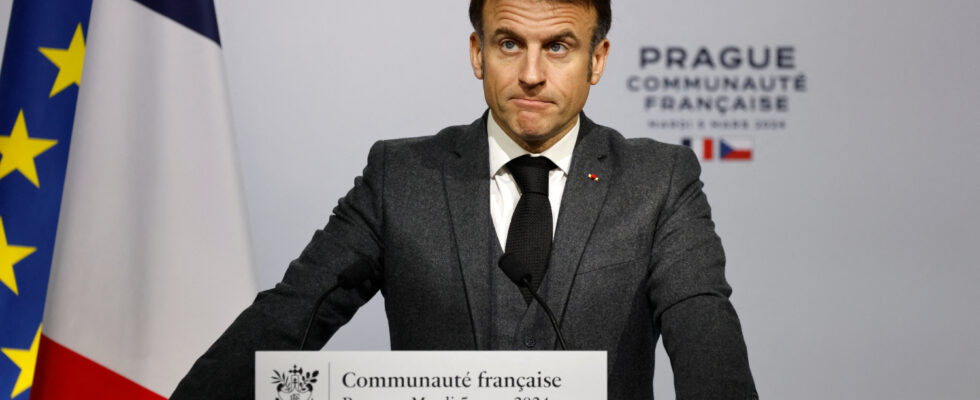Emmanuel Macron called on Ukraine’s allies in Prague on Tuesday to “not be cowardly” in the face of a Russia “that has become unstoppable”, seeming to accept his controversial comments on the possibility of sending Western troops to this country at war. “We are certainly approaching a moment in our Europe where it will be appropriate not to be cowards,” launched the French president at the start of his visit to the Czech Republic. “We never want to see the tragedies that come,” he warned to the French community.
“Powers” who “are expanding the threat every day”
“If every day we explain what our limits are” in the face of Russian President Vladimir Putin who “has none and launched this war, I can already tell you that the spirit of defeat is there lurking,” warned the French president. Emmanuel Macron also spoke of “powers that have become unstoppable” which “are expanding the threat every day, attacking us more”. “We will have to live up to History and the courage it implies,” he insisted. The visit to the Czech Republic aims to showcase his “special attention” to Central Europe, his entourage explained to the press.
At a time when he seems more and more to want to impose his leadership in supporting Kiev and the standoff with Russia, he will meet his counterpart Petr Pavel, whom he received in Paris in December. And sign with Prime Minister Petr Fiala a 2024-2028 action plan for the bilateral strategic partnership in which “defense issues will be key” in the current war context, he said.
“Strategic ambiguity”
Emmanuel Macron knows he is expected. During an international conference on February 26 at the Élysée presidential palace, he sowed trouble among Kiev’s other allies by assuming “strategic ambiguity” so that Russian President Vladimir Putin knows that everything will be done for him. prevent us from “winning this war”. He then explained that sending Western military personnel to Ukraine could not “be ruled out” in the future, even if he recognized that there was no “consensus” at present. The French government then clarified that these would be non-combat missions.
But from the United States to Germany, including the vast majority of other allies, leaders have succeeded one another to distance themselves from the French president’s remarks and assure that there was no question of sending soldiers on the ground. Ukrainian, offering an image of division in the Western camp. Vladimir Putin warned of a “real threat” of nuclear war in the event of escalation. “We are not at war against the Russian people and we refuse to enter into a logic of escalation,” Emmanuel Macron responded remotely in the Czech newspaper Pravo, while assuming to launch this “debate” on “all this what can be done to support Ukraine.
Develop arms manufacturing in Europe
A week ago, he outlined several avenues for strengthening the military support provided to the Ukrainian army, which is suffering setbacks on the front. Among these solutions is a Czech initiative to buy ammunition outside the European Union, due to the current shortage which complicates the lives of Ukrainian soldiers on the battlefield, and then deliver it to them. As early as mid-February, Petr Pavel had mentioned some 800,000 munitions which could be sent to Ukraine “in a few weeks” if the necessary financing (1.5 billion dollars, according to the Financial Times) were gathered.
Long reserved, Emmanuel Macron announced last week that his country would participate in this initiative but without quantifying its contribution, unlike other states such as the Netherlands which have promised 100 million euros. Czech authorities hope he will do so on Tuesday. The visit “will be an opportunity to discuss this initiative” and possibly provide these “clarifications”, a French advisor simply said. While putting into perspective the scope of this “ad hoc” and “emergency” mechanism on the basis of “bilateral” participations, while Paris still pleads for European money to be used to finance the production of weapons within the European Union, in the name of its sovereignty and the development of its defense industry.
On the economic level, his visit also aims to support the candidacy of the French electricity group EDF which aims to win the market for a Czech civil nuclear program which could include the construction of up to four reactors.
